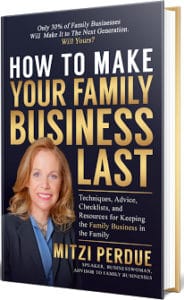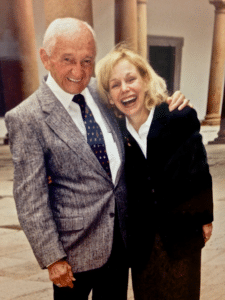Books
Indian Culture Bolsters Family Businesses: Author

Mitzi Perdue
Mitzi Perdue, author of How to Make Your Family Business Last, says Indian family businesses have an inherent cultural advantage.
That India has the third highest number of family-owned businesses in the world is easy enough to explain, according to Mitzi Perdue, author of How to Make Your Family Business Last. The country, with its emphasis on relationships and family bonds, enjoys obvious benefits.
“Hindus are all about family and they put, I feel, unusual effort into keeping strong and connected families,” says Perdue, the daughter of Sheraton hotels co-founder Ernest Henderson and wife of the late Frank Perdue, of the American chicken empire Perdue Farms. “My view is tradition is the lifeblood of identity, and I’m trying to think if there’s any culture that is as rich in tradition,” she adds, pointing out how Indian business families are blessed to have a culture that is effective at promoting family coherence.
Perdue, 76, has put decades of her experience observing and being a part of two iconic American businesses in the book, offering practical advice on how a family business can develop a culture that supports its conservation and progress. The Henderson Estate Company, forerunner of the Sheraton Hotels that her father co-founded, was established in 1890. Perdue spent her initial years observing the part strong values and positive culture played in building a large business, before emerging as a successful businesswoman herself.
The most important lesson that surfaced perhaps was on ways to deal with discord between family members. Only 30 per cent of family business will make it to the next generation, she says, with family strife playing a major role in the disintegration process.

The discords are increasing with technological advancements, especially in developing countries. “I hear countless stories of the wrenching disruption that can happen in India, because the cultural gap between the past and today’s high-tech ultra-modern Indian business is, I feel, hard to imagine,” she says, describing how the enthusiasm of a Harvard-educated young family member can be a tough sell when he comes back to an established family business that has been doing well and isn’t keen on change.
But then, times do change, requiring business patriarchs to mold their opinions. Giving the young women in the family a leadership role in the enterprise remains difficult for them, especially in countries such as India, where women still trail in social and economic indices. Perdue, however, is all praise for Indian women.
“I attend dozens of family conferences each year and I’m blown away by how brilliant and savvy some of the Indian women I’ve met are,” she says. “In my own family, I don’t think it ever crossed my dear father’s mind that I would be a businesswoman, but I think in 2017, he would embrace it.”
These and her other mantras for the success of family-owned groups often transcend countries and cultures. The businesses in India, a country with 108 publicly-listed family-owned businesses, behind China’s 167 and the United States’ corresponding figure of 121, according to the Credit Suisse Research Institute’s (CSRI) latest “CS Family 1000” report released in October, would find that many of the insights she brings in her book work for them.
And it’s not difficult to figure out why. The culture of togetherness notwithstanding, Indian business families, including some of the largest empires like the Ambanis, have not been strangers to controversies arising out of differences that arose inside the house, and quickly entered public scrutiny. The Henderson family however, Perdue recalls, tried their best to tackle disagreements away from media glare.
“In both the Henderson family, and in the Perdue family, which began as a business in 1920, enormous effort was put into learning how to deal with conflict,” she says, “because there never has been and never will be a family that can avoid all conflicts.”
The tug-of-war between being an individual and belonging to the family, she says, is felt more in business families, because you tend to feel there’s a greater responsibility to the group. “There’s a whole world of others who are influenced by how the family is doing, including employees, stockholders, lenders, customers, and countless others who may be affected by the health of the family business,” she elaborates, talking about how her siblings and she were always made aware that with 20,000 employees and 25,000 stockholders, it would be unwise for family members to let quarrels escalate.

Frank and Mitzi Perdue
“We knew that a public family quarrel could mean we’d be vulnerable to competitors; it would be demoralizing to the employees; it would harm the brand,” she says, recounting an issue that erupted in 1968. Some of the family members wanted to take advantage of an attractive offer by ITT to buy the Sheraton chain. Though the offer dangled a huge amount of instant cash, many in the family, including her, were against the sale, since it meant giving up the identity, a business to which her father’s memory was linked, and the feeling of belongingness that they felt toward the company.
“It’s a great big bubbling stew of some of your strongest feelings,” she says. “In the case of me and my siblings, emotions were at white-hot levels.” However, none of them ever spoke to lawyers or the press. “I don’t think anyone outside the family knew what we were feeling 50 years ago.”
The family did sell Sheraton. They kept a united front, and nobody held a grudge.
Perdue places enormous emphasis on the family’s culture that needs to teach the young members that they need to work and study harder than non-family members. “This may seem really harsh, but early on in his business life, my late husband fired his own brother-in-law!” she reveals. “It was the right thing to do, because if he hadn’t, other family members might have thought that they could get away with not working hard.”
Though Perdue says she is not sure if her observations would apply to all nationalities and cultures, she believes “they apply exceptionally well to Hindus.” This idea, she says, is based on the fact that she has three times been invited to give her talk in front of the groups on keeping the family business together across the generations. “I’ve just had the privilege of addressing 450 Hindus for the Ekal Gala,” she adds. “Since they’re kind enough to keep inviting me back, I’m ready to believe that the message resonates.”

You must be logged in to post a comment Login